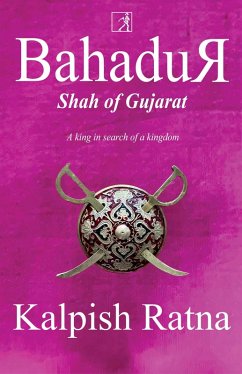Time has forgotten Bahadur Khan. History has condemned him as a drunken wastrel and overlooked his military genius.
Part man, part horse; part Hindu, part Muslim; part Rajput, part Gujarati; what was he like, really, this rebellious young man?
A warrior born, why did he refuse the most vital battle in history?
Why did he surrender the islands of Bombay to two centuries of Portuguese rule?
This is the story of that renegade prince, Bahadur, Shah of Gujarat.
When Vasco da Gama lands near Kozhikode on 20 May 1498, he seems scant more than a visiting trader, just another discourteous barbarian, hardly a threat. But the aughts of the new century bring seismic change. Portuguese violence on the coast escalates and piracy menaces the Spice Route. Gujarat, richest among Indian kingdoms, nourished by her eighty-seven ports, feels the tremors.
It is a time of shifting loyalties. Sultans wage war on land and forge uneasy entente at sea. Borders are redrawn, new kingdoms and principalities take shape. In Dilli, the throne of Hindustan is up for auction, and everybody is bidding. Alliances form and dissolve between Rajput, Lodhi, and Sharqi, while from across the mountains glares the Chagtai, Zahiruddin Babar. Into this tense arena strolls a teenager, Bahadur, Prince of Gujarat, exiled for his wildness; at nineteen, famous already for his prowess in battle. As battle lines are drawn at Panipat, veterans hold their breath. They know the fortunes of Hindustan depend on this untried youngster.
In this powerfully imagined narrative, Kalpish Ratna recreates the obscure signposts of Bahadur's life drawing facts from Indian histories. The language sparkles, filigreed with lapidary skill. In various narrative styles, myth and legend blend metamagically with the tragic events of medieval history. Bahadur, masterfully delineated in chiaroscuro, reflects the confused loyalties of young Indians today. The story of this medieval prince belongs in our own times.
Part man, part horse; part Hindu, part Muslim; part Rajput, part Gujarati; what was he like, really, this rebellious young man?
A warrior born, why did he refuse the most vital battle in history?
Why did he surrender the islands of Bombay to two centuries of Portuguese rule?
This is the story of that renegade prince, Bahadur, Shah of Gujarat.
When Vasco da Gama lands near Kozhikode on 20 May 1498, he seems scant more than a visiting trader, just another discourteous barbarian, hardly a threat. But the aughts of the new century bring seismic change. Portuguese violence on the coast escalates and piracy menaces the Spice Route. Gujarat, richest among Indian kingdoms, nourished by her eighty-seven ports, feels the tremors.
It is a time of shifting loyalties. Sultans wage war on land and forge uneasy entente at sea. Borders are redrawn, new kingdoms and principalities take shape. In Dilli, the throne of Hindustan is up for auction, and everybody is bidding. Alliances form and dissolve between Rajput, Lodhi, and Sharqi, while from across the mountains glares the Chagtai, Zahiruddin Babar. Into this tense arena strolls a teenager, Bahadur, Prince of Gujarat, exiled for his wildness; at nineteen, famous already for his prowess in battle. As battle lines are drawn at Panipat, veterans hold their breath. They know the fortunes of Hindustan depend on this untried youngster.
In this powerfully imagined narrative, Kalpish Ratna recreates the obscure signposts of Bahadur's life drawing facts from Indian histories. The language sparkles, filigreed with lapidary skill. In various narrative styles, myth and legend blend metamagically with the tragic events of medieval history. Bahadur, masterfully delineated in chiaroscuro, reflects the confused loyalties of young Indians today. The story of this medieval prince belongs in our own times.
Dieser Download kann aus rechtlichen Gründen nur mit Rechnungsadresse in A, B, BG, CY, CZ, D, DK, EW, E, FIN, F, GR, HR, H, I, LT, L, LR, M, NL, PL, P, R, S, SLO, SK ausgeliefert werden.









